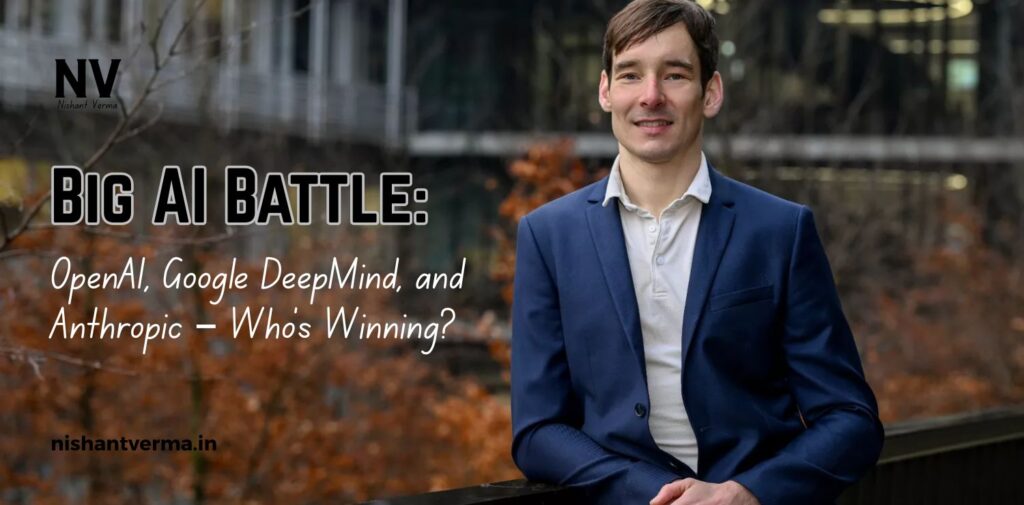In today’s fast-changing world, Artificial Intelligence (AI) has become one of the most powerful technologies shaping our future. From voice assistants in smartphones to smart recommendations on shopping apps, AI is everywhere. But behind this amazing progress are some of the biggest research companies racing to become the leaders in the AI world. The top three names you must know are OpenAI, Google DeepMind, and Anthropic.
Each of these companies has a different style, a different approach, and big goals for how they want AI to help the world. But who is truly leading the AI race? Let’s break it down in simple language so you can understand how each of them is shaping our digital future—and how it matters to us in India too.

OpenAI – The Power Behind ChatGPT
OpenAI became a household name in 2023, especially after the launch of ChatGPT. People around the world—including in India—started using it for everything: from writing emails and essays to coding and solving tough questions. OpenAI’s biggest strength is its focus on creating AI tools that are helpful and easy to use for everyone, not just experts.
The company was started in 2015 by Elon Musk and Sam Altman, with the aim to build safe and powerful AI that benefits all of humanity. Today, OpenAI’s GPT models (short for Generative Pre-trained Transformers) are among the most advanced in the world.
In India, students, developers, businesses, and even teachers are using tools like ChatGPT for learning, productivity, and support. It has already created a big impact on how people work and learn in cities as well as smaller towns. OpenAI has partnered with companies like Microsoft, which brings their technology to platforms like Word, Excel, and even the Bing search engine.
OpenAI is currently focused on making AI safe, trustworthy, and useful, while also constantly improving its models. It also supports developers through APIs, helping Indian startups and creators build smart applications faster than ever.
Google DeepMind – The Scientist of the AI World
DeepMind is part of Google’s Alphabet group, and it has a different kind of reputation. If OpenAI is like a friendly toolmaker, DeepMind is like a research scientist working quietly in the background. It may not be as popular among everyday users, but its work is extremely powerful.
DeepMind made headlines when it built AlphaGo, the AI that defeated the world champion in the board game Go—a task that was once thought impossible. Later, it created AlphaFold, which solved one of biology’s biggest problems: predicting how proteins fold. This discovery is helping scientists around the world develop better medicines and understand diseases faster.
DeepMind’s strength lies in scientific innovation and deep research. It is not focused on launching AI chatbots for public use as much as OpenAI, but it continues to influence the world in meaningful ways. Recently, Google started merging DeepMind’s work with its products through a group called Google DeepMind, which works on both research and real-world AI applications.
In India, DeepMind’s research is used in healthcare, education, and scientific fields, but most people may not even realize it because the company works mostly behind the scenes.

Anthropic – The New Player with Big Ideas
Anthropic is a newer name in the AI space, but it’s gaining attention fast. It was started by ex-OpenAI employees who wanted to build safe and ethical AI systems. The company is best known for its chatbot called Claude, which is named after Claude Shannon, the father of information theory.
Anthropic believes that AI systems must be built with strong safety limits and should be understandable by humans. Their goal is to make AI not only smarter but also safer, so it doesn’t cause harm or behave in unexpected ways.
Claude is known for being calm, polite, and thoughtful in its responses. Though it’s not as famous as ChatGPT yet, it’s gaining popularity among developers and businesses who care about AI safety and reliability. In the coming years, Anthropic could become a strong competitor to OpenAI.
In India, Anthropic’s tools are slowly entering the tech scene through partnerships and cloud platforms. While it’s not widely used by the public yet, its focus on ethical AI could appeal to Indian developers, educators, and startups who want responsible AI solutions.
India’s Role and Benefit in the AI Revolution
India is not just a consumer of AI anymore—it is becoming a major part of the global AI ecosystem. With one of the largest numbers of software engineers and developers in the world, India is home to a growing AI startup scene. Indian companies are using AI for everything from agriculture to health, education, e-commerce, and customer service.
OpenAI’s tools like ChatGPT have become popular among students, freelancers, and professionals. Google’s AI features are already a part of the smartphones we use daily. Anthropic’s ideas may influence future education and government policies focused on AI safety and ethics.
The Indian government has also taken steps to support AI growth, including plans for AI research centers and talent development programs. As more Indian startups adopt AI, the demand for reliable, safe, and powerful tools will only grow.
Who is Leading the Race Right Now?
If we look at popularity and public use, OpenAI is clearly leading the race. ChatGPT has changed the way people interact with AI, and its models are being used by millions every day. It is ahead in terms of visibility, partnerships, and ease of use.
Google DeepMind is ahead in scientific achievements and research strength. Its innovations are used in industries like healthcare, science, and education, often without people even realizing.
Anthropic is still growing, but it brings strong competition with a fresh approach to AI safety and design. As more people become concerned about AI ethics, Anthropic may win more trust in the future.
So, each company is leading in its own way. The real winner depends on what matters most—popularity, scientific impact, or safe design.

What Can You Expect in the Future?
The AI race is far from over. In fact, it is just beginning. In the next few years, we will see even more advanced models, better tools, and smarter systems. OpenAI is already working on newer versions of GPT, Google is integrating AI across all its products, and Anthropic is focused on building next-generation AI that is as safe as it is smart.
For Indian users, this means more access to global technology, faster growth in local businesses, and more career opportunities in the AI sector. Students can learn AI skills and work for these global companies. Small startups can use these tools to build powerful apps. Even rural areas can benefit from AI in education, health, and agriculture.
So, no matter who wins the AI race, it’s clear that we all benefit. The best thing you can do? Stay informed, explore AI tools, and learn how to use them wisely.
Final Thoughts
The race between OpenAI, Google DeepMind, and Anthropic is not about who beats whom, but about who contributes more to society in the long run. For India, the future of AI is full of hope, opportunities, and exciting possibilities. Whether you’re a student, a teacher, a business owner, or just someone curious about technology—this is the right time to be a part of the AI journey.
Keep learning, keep exploring, and keep growing with the power of AI.




